Craig Cliff's Blog, page 31
April 16, 2011
Wulf vs The Sea-Wolf

 I read/listened to these two books over the same period and it is entirely arbitrary of me to compare and contrast them. The wolfiness of their titles was just a coincidence (no actual wolves were harmed during the making of these books). The reason I read each book were: I'll be appearing with Clayton in a session on debut authors at the Auckland Writers Fest next month and besides this found the reviews of his novel intriguing; I really wanted to read Call of the Wild, but London's The Sea-Wolf was the only audiobook available to download/borrow from the Wellington City Library's online service.
I read/listened to these two books over the same period and it is entirely arbitrary of me to compare and contrast them. The wolfiness of their titles was just a coincidence (no actual wolves were harmed during the making of these books). The reason I read each book were: I'll be appearing with Clayton in a session on debut authors at the Auckland Writers Fest next month and besides this found the reviews of his novel intriguing; I really wanted to read Call of the Wild, but London's The Sea-Wolf was the only audiobook available to download/borrow from the Wellington City Library's online service.Wulf's title refers both to the Old English poem, 'Wulf' or 'Wulf and Eadwacer' and the Maori chief/historical cipher Te Rauparaha who is referred to in lupine terms throughout the novel.
The wolf in The Sea-Wolf is Wolf Larsen, the captain of the seal-hunting schooner, The Ghost.
Aside from the wolves, both novels take place mostly on board a ship. Wulf came out in 2011 but is set in 1830. The Sea-Wolf was published in 1906 and the action is contemporary. I felt more familiar with the layout of the ship and the elements of 'ship business' in London's book, but Clayton's manages to touch on the experience of being a sailor far from home and experiencing a new land in a way that is hard to shake.
Clayton's novel is told in highly poetic, dreamy, fragmented prose. It is at the level of language, of individual words and clauses, that the novel excels. London's novel is more focussed on ideas and the traditional, linear A happens, B happens, C happens plot. Most of Wulf's A-B-C (the British merchant ship arrives in Kapiti and ends up ferrying Te Rauparaha and his warriors to the Banks Peninsula to chiefnap an enemy) is submerged, quite deliberately, in the act of storytelling.
They are both good books, but entirely different. To illustrate this point: The Sea-Wolf has been made into a film thirteen times. I can't imagine what a film version of Wulf would look like and would call anyone who attempted to adapt it to the screen bonkers. A book that cannot be translated into something else is often a glorious thing. Equally, there has to be something elementally right in a novel if it continues to be adapted and updated.
 It is hard to take comparison between the two books any further. Instead, the comparison that screamed out to me while reading The Sea-Wolf was Moby Dick. I have professed my love of Melville's masterpiece here before, and it is no surprise London's book comes up short. It is as if London has combined the discursive, quirky Ishmael with the mad, driven Ahab in the character of Wolf Larsen. Larsen is both an autodidact who quotes philosophers and poets and a sociopath who revels in the death of numerous members of his crew and kidnaps multiple characters forcing them to work on The Ghost.
It is hard to take comparison between the two books any further. Instead, the comparison that screamed out to me while reading The Sea-Wolf was Moby Dick. I have professed my love of Melville's masterpiece here before, and it is no surprise London's book comes up short. It is as if London has combined the discursive, quirky Ishmael with the mad, driven Ahab in the character of Wolf Larsen. Larsen is both an autodidact who quotes philosophers and poets and a sociopath who revels in the death of numerous members of his crew and kidnaps multiple characters forcing them to work on The Ghost. While this is an interesting idea and the character of Wolf Larsen is certainly the most memorable part of the novel, The Sea-Wolf falls short of Moby Dick by giving us too much of a good thing. We are in Wolf Larsen's company often so that we may hear his jaundiced survival-of-the-fittest, dog-eat-dog view of the world, whereas Ahab is withheld from the reader both by Ishmael's lack of access to the captain and his own keenness to fill the silence with talk about whales and democracy.
It seems to me that Clayton has produced the more Melvillian book by withholding his Ahab -- the revenge-driven, blood-thirsty and flesh-hungry Te Rauparaha -- and producing a shadow play of myth and rumour upon the surface. Before things start to sound too hyperbolic, neither of the British mouth-pieces for the novel, the unnamed narrator and the storytelling sailor Cowell, are as good company as Ishmael, and I felt the plot aspects may have been submerged slightly too far beneath the dreamy language… Let's be clear: it is a difficult read and will not appeal to everyone, though for the right reader, it is a rewarding experience.
April 13, 2011
Worksheet #80, or A Lawn to Mow
*
Real names I encountered while travelling last fortnight which I reserve the right to call characters (or children)
Fritzie (according to her name badge, Changi Airport)
Kiko (not sure how it's spelt, but it belonged to a female from Brazil)
Dung (Vietnamese tour guide, probably not suitable for Kiwi children, even if it is pronounced more like 'Jung')
*
Whiner alert: This is where I complain about my good fortune not being good enough.
I have received some more details about the outreach elements of the Commonwealth Writers Prize programme in Sydney in May (coincides with Sydney Writers Fest). We are going to the Juniperina Juvenile Justice Centre, Blacktown Girls High School, Penrith High School and Gawura (place in central Sydney that focuses on raising education achievement of Aboriginal and Torres Strait Islander people). We'll also appear on Radio Koori's Blackchat programme and there's a reception at the Admiralty House hosted by the Governor General…
My gripe? The Juvenile Justice Centre is female only, so is Blacktown Girls High School (funnily enough). Literacy is a big issue across the board, but it's widely agreed that girls read more than boys and are doing better in the current educational environment. Is this a case of picking the low hanging fruit? Well, not that low hanging: it's not like we're going to rich private schools and universities. And maybe taking a bunch of green writers to a male juvie centre may be asking for trouble, but it seems a shame not to try. My mild frustration is akin to the uproar yesterday when the Australian scientist suggested letting the Kakapo die off and using the money to save 'easier' species from extinction.
Boys don't read. Short story collections don't sell. Australians don't read New Zealand books and vice versa. The book world is full of these mythical absolutes that encourage the continued narrowing of the field.
/rant
*
Mini-milestone: today my friends take possession of their first house, the first of my Wellington friends to do so. Okay, so one of them is a doctor and the dream of home ownerships is a lot further off from a policy analyst/writer and a scientist, but hey, maybe one day I'll have a lawn to mow.
*
Potentially (but hopefully not) mega life-defining milestone: The Sacramento Kings played their last home game today*, which is also their last game of this season as they've missed the playoffs like a Reggie Evans free throw misses the rim. This is also potentially the last ever game for the Sacramento Kings as the owners seem bent on moving them to Anaheim, where they will become known as the Anaheim Royals (or something similar).
I have supported the Kings since 1994. I have been to Sacramento (once, when I was 11) but they only time I've seen them play was actually in Toronto in 2009 (they lost). It's probably more likely I'll go to Anaheim than Sacramento in the next 20 years (kiddies wanting to go to Disneyland, perhaps), but still, I'll be gutted if they move.
It will not only turn my Mitch Richmond, Chris Webber and Peja Stojakovic jerseys into oddball paraphernalia rather than retro strips, like those Shawn Kemp Sonics or Alonzo Morning Charlotte Hornets jerseys, but Richmond, Webber and Vlade Divac will no longer have an arena in which to hang their retired jersey numbers.
I will become the supporter of the third NBA team in the LA area. Excuse me while I take a shower…
What will happen to Sactown Royalty, one of my favourite websites? What will happen to Jerry Reynolds, my favourite colour commentator and all around nice guy (I don't really care what happens to play-by-play man and all around douche Grant 'Peaches' Napear)?
I've supported this team through thin (Richmond era) and thick (Webber era) and thin again (post-Webber's knee blowing out). While the current roster will be transplanted down to Anaheim, and while I'll continue to root for DeMarcus and Marcus and Tyreke (amazing to think that he's the third most important player after this season) and Beno and Sammy and Jason and Pooh and tonight's small forward of choice… it won't be the same.
My life will be divided into Sacramento Kings Era (SKE) and Post Sacramento Kings Era (PSKE).
That is unless the move falls through. If Jerry Buss convinces the other NBA franchise owners to vote against the move. Or some dues ex machine swoops in and secures a new arena in Sacramento in the next, oh, 18 hours. Or the Maloofs lose their nerve and decide to wait and see for another year…
---
* I haven't watched the game yet... about to load it up on NBA Broadband. C'mon Good, triumph over Evil one more time!
April 10, 2011
I should probably type 'Viet Nam' from now on to prove I've been there but...
Come with me...

We went to Vietnam with the primary objective of getting Marisa's wedding dress made -- and we achieved this relatively smoothly, but after visiting the War Museum and Cu Chi Tunnels in recent days it doesn't seem right to reflect on this trip as a type of military mission. Better to focus on life-affirming things like the kindness of the people (there were a couple half-hearted scammers but they'd always acquiesce if you put your foot down, pat you on the shoulder and bid you a pleasant journey).
Beyond the dress, we were there for the food, the culture and a break from work, probably in that order, though it all comes back to food in the end. If the way to a man's heart is through his stomach, the way into Vietnam is through it's street food. Marisa and I ate in a variety of settings, from carts and off the back of scooters, at pavement stalls, in back alley restaurants and in tourist-trappy eateries. Everything was good, but as a general rule: the smaller the seats and the closer you sat to the ground, the better the food.


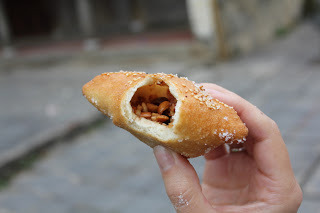


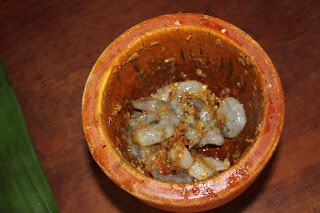
Of course, we did more than eat (that last photo is from a class we did in Hoi An, so we cooked as well).
There was some wildlife...
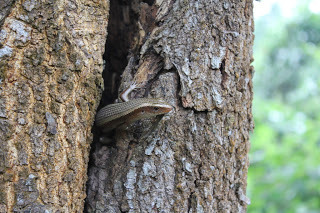
And historic places...

And charming-scary building practices that took me back to Bolivia...

And mysterious doors...
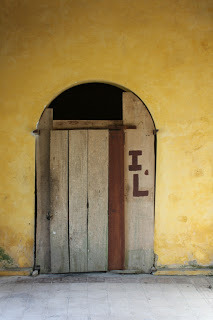
And dogs with mohawks...
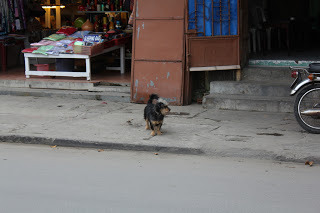
Seriously. A dog with a mohawk...
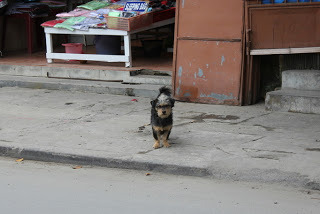
You can't top that.
I read some books too, so my reading update debt continues to grow...
And in the back of my mind I did consider that going to a developing country for two weeks may help with my weight-loss regimen (regimen = weigh myself every now and then and hope the number is smaller than last time). I did lose 0.6 kgs, but I'm not sure that beats the margin of error. And I'm still heavier than this kid.
*
And finally, because I had such a great time, he's a suggestion for the next tourist campaign for Vietnam from a prize winning writer which the government there can have gratis.
Vietnam: a great place to visit, especially if you're writing a novel about mannequins.
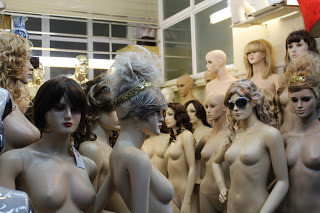
March 23, 2011
A head in seven places
(They're Canadian.)
*
*
For those unfamiliar with my musical tastes, I'm a Dark Canuck (link, link).
*
I've been up in Auckland for work. Two solid days thinking about school design from first principles. Really cool stuff. Hopefully I get the chance to send my as-yet-nonexistent kids to a school like the ones that are getting built now and not something stuck in the "cells and bells" mode of teaching... Although there's a place for that I suppose. I think they call that "parental choice".
*
*
I'm locked in for two sessions at the Auckland Writers Fest in May (one called 'Emerging Writers', another about the Commonwealth Writers Prize with me, David Mitchell and Aminatta Forna) and five sessions as part of the Sydney Writers Fest the following week! Yeah, five. And that doesn't count the outreach events that CWP are planning (school visits, a trip to juvie etc), these are just ones that'll be printed in the SWF programme (though in Australia it'll be spelt 'program' -- can anyone think of any other words where Aus/NZ spelling differs??)
One event is in the Blue Mountains, one's in Parramatta and three are in Sydney proper. Three are with other CWP regional winners but I'm on two panels, one about 'Bromance: the truth about male friendship' (or something) and another about whether Australia has lost it's sense of humour (me being the token Kiwi on the panel). I like the fact these last two give me the chance to promote myself as a writer with a sense of humour. That often gets lost in the mix with reviews and other media stuff. It's a book of short stories which means it's got a limited audience (why?) so it must mean it's literary (sorta) which means it can't ever be funny (????).
David Geary will always have a special place in my heart (/ego?) because the first thing he said about my book was, "'Fat Camp': seriously funny stuff."
Oh, and I just got asked to appear at the Melbourne Writers Festival in late Aug/early Sept. How cool is that? All thanks to my success in the Commonwealth Writers Prize. I better remember all this good fortune when it's time for Thanksgiving in November...
*
Note: I've decided never to include an apostrophe in the name of any writers and/or readers festival because the festivals can't even decide between themselves where it should go or if there should be one at all.
*
*
This may be my last blog post for a while as we're off to Vietnam on Saturday for our buttermoon (this is an in-joke between me, M. and anyone who read my column in the Dom Post last week, so, like, 17 people).
Taking my new camera (of course). I'll refrain from the full holiday slideshow post when I get back (isn't that what Facebook's for? that, and stalking girls you fancied in intermediate) but may slip one or two in a post when I get back just to make y'all jealous.
Coz that's the kind of friend I am.
March 16, 2011
Two photos
It arrived yesterday and it's loooooove.
I don't know a lot about photography but my brother is a trained photographer (he took my author photo, don't ya know) and sells camera for a living, so I should pick a few things up.
Here's a photo of a seagull taken from my deck (reduced quality for internet posting):
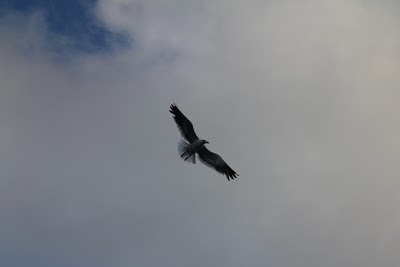
And here's the pile of books I'm currently reading*:
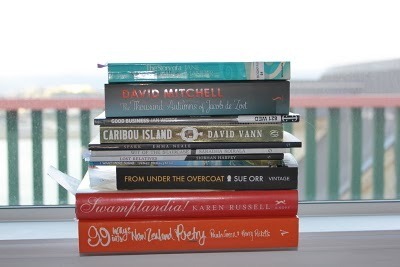
* You can see a number of bookmarks** in these books to prove I'm mid-stream. I normally read 2-3 books at once (not pictured, The Sea Wolf by Jack London, because it's an audiobook I'm listening to on my iPod), but things have gotten a bit crazy lately. The slim volumes are all poetry (I picked up several at the launch of Siobhan Harvey's Lost Relatives, also pictured, last week) which I am reading, re-reading in fits and starts.
** I don't think any are actual bookmarks. There's a library check-out slip, a supermarket receipt, a half a post-it and a $2 scratchie that's won $4 but I can't cash it in until I finish the book.
Repost: A Man Melting, The Playlist
I'm reposting it in one grand pubah of a post now for those of you who missed it the first time around and to make it easier to link to in the future...
A word about my selections.
While there are a number of references to musical artists in the collection, most of the time they are only in passing. A song on the radio (Nelly Furtado's 'Maneater') or a bored teen's Wikipedia fix (Styx, Stones and Serj Tankian). Instead, I've tried to marry each story with a song that both speaks to the content of the story and it's mood. Some matches are more successful than others.
As the manuscript was pretty much completed in 2008 (save for the addition on one story and final edits), I've also tried to stick to songs I would have listened to during that period. Indeed, I wrote about many of these artists on my blog back in 2008, and I'll link to any such posts where applicable.
1. Seeds
The story: Aaron's life story in 3.5 pages featuring imaginary friends, cockroaches and an intrusive narrator.
When Aaron was five and a half he had an imaginary friend called Groucho. They had a great time together, getting into mischief, making potions from cleaning products underneath the washhouse sink, pretending to be aeroplanes in the autumn winds.
But then Groucho had an identity crisis…
The song: 'If I could talk I'd tell you' - The Lemonheads
What better way to start a playlist than with a zippy, sub-three-minute pop song... which is the same reasoning behind 'Seeds' opening my collection.
If I could talk I'd tell you
If I could smile I'd let you know
You are far and away
My most imaginary friend
2. Manawatu
The story: Glen returns to Palmerston North for the holidays, gets depressed and considers jumping off his auntie's balcony.
Leaning out from the balcony, he sized up the jump. It's only one storey. It's nothing. I'm going to jump. Young Heart, Easy Living, the slogan for the Manawatu region. Is there anything easy about living with a young heart, always thirsting for something else, something hidden like the river I want to be immersed in right now but I'm still on the balcony? Still sizing it up…
The song: 'Jump' – Van Halen
When I was younger my mum told me this story the morning after my father's work Christmas party: When 'Jump' came on, my dad climbed on to the banister of the mezzanine level and started miming / performing his daredevil David Lee Roth. People either thought he was drunk or serious about jumping, though he was neither.
I think this story was there, somewhere deep in the back of my mind, when I wrote 'Manawatu'.
Ah, might as well jump. Jump!
Might as well jump.
Go ahead, jump.
3. Copies
The story: A son reflects on the life of his father, an artist who liked to photocopy famous artworks over and over and over, and what his own future may hold.
My earliest memory of my father is probably like these copies: a string of memories, moving from the original moment — if it ever happened — to my current recollection like a Chinese whisper, changing slightly each time I trawl it up.The song: 'Diminishing Returns' – Harvey Danger
Harvey Danger? You know, those one hit wonders responsible for 1998's 'Flagpole Sitta'. They released their 2005 album, Little by Little for free on the internet (well before that was the thing to be doing) and that's how I came across 'Diminishing Returns' – a song that seems to speak to the movement away from the original (be it a moment, a parent or a piece of art).
Progress shall be defined
By your position on the bridge
As it burns
When populism, activism, urbanism fail
My cooler head, my cooler head will prevail
When there are no more gods left to anoint
No more noses to bend out of joint
I'm gonna meet you at the point of diminishing returns
Footnote: Photocopier by Fujiya and Miyagi deserves a mention here, but failed to make the list because I hadn't heard the song in 2008.
4. Oh! So Careless
The story: Penny and Leo go on an overland tour of South-East Africa at a rocky point in their relationship.
And so Penny spent the seven hour drive north through the Drakensburg Ranges with an empty seat next to her. The others played cards, exchanged flight stories, and made iPod playlists which would last three songs on the stereo before being pulled in favour of a fresher mix.The song: 'Under African Skies' – Paul Simon
It took me a while to warm to Graceland as an album – I think I felt Simon was riding the coattails of another culture and music, but eventually the songs won out. Like 'Oh! So Careless', Africa is merely a setting in 'Under African Skies' – both the song and the story are concerned with more than red dirt and giraffes.
This is the story of how we begin to remember
This is the powerful pulsing of love in the vein
After the dream of falling and calling your name out
These are the roots of rhythm
And the roots of rhythm remain
5. Parisian Blue
The story: Megan set out to travel the world with Tessa, but after an almighty argument in Paris, she goes it alone.
In Kampong Som, Megan enjoyed a strange form of celebrity. She was not the only white person, but the others came in hand-holding pairs or giggling, uncountable packs. Perhaps, she wondered on her first day, the lack of females traveling alone was a fluke. A seasonal quirk. She had been to rougher places by herself, after all. But in Dar es Salaam or Khartoum people weren't surprised — they were perhaps a little offended, but not surprised. Here she stood out.The song: 'Home' – Foo Fighters
"Echoes and silence, patience and grace" is both the name of the album (minus an "and") from which this song is taken, and a line within 'Home'. Echoes and silence are also a big part of the final scene in the story, as are the sense of homesickness (or homelessness) and regret that pervades this song.
Wish I were with you
I couldn't stay
Every direction
Leads me away
Pray for tomorrow
But for today
All I want is to be home
[And here's my accidental review of Echoes Silence Patience and Grace back in December 2007].
6. The Tin Man
The story: Jason, a "book-shaped kid in a ball-shaped school", is the victim (or is it beneficiary?) of the school bullies' latest scheme.
Jason Stride is being wrapped in tinfoil and no one really knows why, it just has to happen. This is often the way with high school: deep down no one really believes it is the real world, so no one insists that every action must have an equal and opposite reaction. Embarrassment can happen without reason, violations can go unpunished and minding your own business can get you wrapped in tinfoil.The song: 'The Hard Way' – The Kinks
I listened to a lot of the Kinks in 2008, and I blogged about them four times in a two month span. This song, from School Boys in Disgrace, is from the perspective of a teacher, but it could equally be Jason's thoughts at the opening of the story about his tormentors.
Boys like you were born to waste,
You never listen to a word I say
And if you think you're here to mess around,
You're making a big mistake,
'Cos you're gonna find out the hard way,
You gonna find out the hard way.
7. Untitled (Crimson and Gold)
The story: Laura is trying to put the past behind her and move on with the help of her therapist and his handy techniques.
[Dr. Rothko] told me everything I was doing was okay. That I could feel guilty about the accident, but shouldn't waste my guilt on secondary or tertiary things like how I sometimes pretend it was someone else's accident, that the slippers were possessed, that it was Lennon's fault.The song: 'Untitled #1' - Spain
As a rule I dislike untitled things (my story actually has a title which just happens to include the word 'untitled'), but this song, from the compilation Piece of Cake: 20 Years of Ryko, ticks a lot of boxes…
Walked away released from all my crimes
Walked away released from all my crimes
But I could never hide what I kept inside
8. Another Language
The story: When James' grandfather tells him he moved to New Zealand because of his stutter, wee Jim sets out to see if you can really stutter in one language but not another.
After choir I said, 'You don't stutter when you sing!'
'I wish I didn't stutter at all.'
'You should live in a musical,' I said, and thought about my grandfather. Moving to New Zealand would have been like coming to live in a musical for him, except he was sad and quiet. I thought, what's the point in moving somewhere you can talk without stuttering if you aren't going to talk?The song: 'Singing in the Rain' – Gene Kelly
My favourite musical and one of my favourite films, this is the sort of moment I'm sure James is thinking of when he imagines living in a musical.
I'm singing in the rain
Just singing in the rain
What a glorious feelin'
I'm happy again
I'm laughing at clouds
So dark up above
The sun's in my heart
And I'm ready for love
9. Give Me Bread and Call Me Stupid
The story: Bembe and Rosa leave Madrid to revive their flagging English with a year in Edinburgh, but find the job hunt fraught with frustrations.
He had been in Edinburgh for six weeks by this time, but English still felt like wearing a stranger's suit. His subconscious, however, seemed to be adapting more quickly. His dreams all seemed to revolve around Spanish-English puns.
A team of archers firing grains of rice (arroz)
A horse and cart, except the cart has been replaced with a giant letter (carta) from his grandmother.
A line of coy, blushing women, all clearly pregnant (embarazada).
And when he laid eyes on Lindsey that first time, the word octopus had popped into his head.The song: 'Bye Bye Pride' - The Go-Betweens
I lived in Brisbane on and off for almost four years; discovering The Go-Betweens is one of the few things I can point to from my time in the sun that I still cherish. 'Bye Bye Pride' (or adios orgullo) is exactly what Bembe must say when confronted by the challenges of a different culture, a different language and a slightly unhinged recruitment agent. Bonus points for the song having a line in Español: In la brisa de la palma, which I used to think was a reference to Brisbane, but just means 'In the breeze of the palms'.
He goes home again.
He dreams resistance,
They talk commitment,
Things change over long distance.
Took the shirt off his back
The eyes from his head
And left him for dead.
10. A Man Melting
The story: Hamish starts melting, and nothing can stop it, not even poetry.
He was quite a sight for the eight year olds: a skeletal man sitting in a paddling pool, sipping from his water bottle via string of straws Sellotaped together, softly talking about poetry. He didn't have many poems to read the class because he didn't collect them. He just left the napkins and the flyers and the newspapers where he found them. Disposable poetry. You can't take yourself too seriously when you're time is nearly up. But he read them the poem he had written on the back of his bus ticket:
Think too much do too little
Think too much say too little
Do little say little
Think think much much
Too too much
The class stared at him. To him they looked like meerkats.The song: 'Poets' – The Tragically Hip
I could probably do an entire playlist using just Tragically Hip songs. According to Last.fm, I listened to over 1000 hips songs in 2008 (the Kinks were second and Warren Zevon third, both around 600). And I've blogged about the band often (like my claim the album Day For Night is 'song noir'; or my top five Tragically Hip earworms). What better place to use my one Hip song, then, than as a match with the title story?
Don't tell me what the poets are doing
On the street and the epitome of vague
Don't tell me how the universe is altered
When you find out how he gets paid, all right
11. Touch
The story: The narrator uses all his wiles to try and hook-up with a friend of a friend at his significant other's birthday party.
'I'll be on the balcony,' I said and eased away, not letting her say a word — another secret of mine. How do you think I wound up with a catch like Alice if I didn't have a few secrets? I'm savvy. I'm a hunter. Sure, I was a little out of practice when Delancey showed up — semi-retired might be another way to put it. But the greats, they never lose their touch.The song: 'All The Wine' – The National
2008 was the year I discovered The National (I blogged about them first in August). When I set out to make this playlist I knew I'd have to include a National song: they are the perfect background music when writing. When I started looking around for songs for 'Touch', the National provided a number to choose from: 'Secret Meeting,' 'Karen', 'Guest Room', 'Apartment Story'… But in the end I've gone with 'All The Wine', which reeks of booze and hubris, much like the narrator in 'Touch'.
I'm put together beautifully, big wet bottle in my fists, big wet rose in my teeth
I'm a perfect piece of ass like every Californian
So tall I take over the street with high-beams shining on my back
A wingspan unbelievable, I'm a festival, I'm a parade
And all the wine is all for me
12. Orbital Resonance
The story: A story in five parts which are seem quite discrete, but orbit the same question of loneliness and connection.
At parties he used to talk about orbits. How they relate to more than just planets. He would ask his audience to imagine two people running around an athletics track: it didn't matter what speed they ran, if they ran for long enough they would come level again. The runners behave differently, he would explain, just before they are level, while they are level and just after they are level…
'The rules changes when two people come together,' he would say, and lean in to kiss whoever he was talking to.
It didn't work often, and certainly not in South Africa, where people couldn't understand his accent when alcohol was involved.The song: 'Parklife' – Blur
One of the many songs that make an appearance in 'Orbital Resonance' (though obliquely), 'Parklife' also captures that loneliness/connection vibe…
I feed the pigeons I sometimes feed the sparrows too
It gives me a sense of enormous well-being
(Parklife)
And then I'm happy for the rest of the day safe in the knowledge
There will always be a bit of my heart devoted to it
All the people
So many people
And they all go hand in hand
Hand in hand through their parklife
13. Fat Camp
The story: Danny and Sophie open a weightloss camp for teenagers in the Scottish Borders, but it's not exactly Danny's dream job.
As he stood at the front gate the next morning to welcome the parents and their chubby spawn, he could pick the cars which were there to drop off kids before they even indicated.
4WD – Yes
Hatchback – No
Jaguar S-type – No
Toyota Minivan – Yes
Mr Whippy ice cream van – That poor kid.The song: 'Fat Children' – Jarvis Cocker
No comment needed here:
Oh, the parents are the problem
Giving birth to maggots without the sense to become flies
So pander to your pampered little princess
of such enormous size
Fat children took my life
14. Facing Galapagos
The story: When David starts receiving emails from someone claiming to be Charles Darwin, he is forced to consider evolution from a new perspective.
'Many people still believe the Galapagos are as untouched as when I arrive the first time. Despite there being no indigenous population, the islands are no home to over forty thousand inhabitants. Not bad for a few lumps of basalt in the middle of the Pacific. Not that I am trying to discourage you from paying a visit, far from it. But it would be remiss of me not to mention the Earth's enforced evolution at the hands of human beings. Many would say devolution, but has this planet ever looked like this before? We're still moving forwards, even if our destination is oblivion.'The song: 'Revolution Rock' – Los Fabulosos Cadillacs
One of the unexpected joys of traveling in South America was hearing Spanish cover versions of English songs. Like hearing 'Eclipse Total del Corazon' in a taxi, and clicking that it was a cover of Bonnie Tyler. Technically I hadn't heard Los Fabulosos Cadillacs' cover of The Clash's 'Revolution Rock' in 2008, but it was on my computer when I expanded the story in 2009 to include the section in Ecuador, so I'm going to excuse myself just this once.
Oye, revolution rock
revolution rock estoy en estado de shock
Revolution revolution ah ah
revolution revolution...
Todo el mundo a mover los pies
y a bailar hasta morir
esta musica causa sensacion
este ritmo golpea la nacion
15. Evolution, Eh?
The story: A minor hoodlum kills time with a friend in Midland Park.
I was thinking about all the tricks as I rode the escalator up, until I saw a dead leaf and a cigarette butt at the top of the escalator getting pushed up against the comb thing that the steps go into. People were just stepping over the leaf and the butt like they didn't notice or like they didn't want to notice, but I thought it was cool. The leaf and the butt looked like they were dancing as they bounced against the comb and the steps slid into the floor. Like they were happy or something. Even though it was a dead leaf and a cigarette butt.The song: 'Dead Leaves and the Dirty Ground' – The White Stripes
The most poetic song Jack White has written. Sure, his dead leaves are things of sadness, and the leaf in 'Evolution, Eh?' is much more hopeful, but it's close enough.
Dead leaves and the dirty ground
when I know you're not around
shiny tops and soda pops
when I hear your lips make a sound
16. The Spirit of Rainbow Gorge
The story: Noah 'Rusty' Kissick achieves his lifelong goal of being elected mayor, only to find he has something bigger to contend with: nature.
The rain kept falling during his interview. 'I really am proud of this community,' he told the reporter, a young man with short hair which had curled tightly in the rain. 'This is the Rainbow Gorge spirit. We're more than just a fishing spot, we're a lifestyle.' A gust of rain-heavy wind blew Kissick off balance and he stumbled backwards, but was saved by a pile of sandbags waiting to be arranged.
'As you can see,' the reporter said, the camera now back on him, 'Rainbow Gorge is a town under siege. With water levels rising, and help slow to arrive, this may be the one that got away. Back to you, Russell and Jacqui, in the studio.'The song: Blame it on the Rain – Milli Vanilli
No one ever seems to have voted for a suddenly unpopular politician. Same goes for once liking an unpopular pop group. If you approach 'Blame it on the Rain' as a piece of fun, suddenly the miming ain't such an issue. But is there anything redeeming about a 'driven but limited man' like Noah Kissick?
You want her back again
But she just don't feel the same
Gotta blame it on something
Gotta blame it on something
Blame it on the rain that was falling, falling
Blame it on the stars that did shine at night
Whatever you do don't put the blame on you
Blame it on the rain yeah yeah
17. The Sceptic's Kid
The story: Jamie, the son of the President of the NZ Sceptics Society, is understandably fascinated by claims that extinct animals are reappearing around the globe.
'Then they caught the really big eagle,' Melanie said, ' yanking his hand to make him pay attention. 'I think it was the government.' I nodded. 'They tried shooting it was darts to put the eagle to sleep, but it was so big they had to shoot a lot of darts into it, and when it finally went to sleep it didn't wake up again. The scientists did tests on it and said it was a Fast Eagle—'
'She means Haast's eagle.'
'—which everyone thought was extinct!'The song: 'Birds' – Paul Weller
Neil Young's avian love song was well covered by Linda Rondstadt but my favorite version has to be Weller's. Any story about New Zealand's native fauna is its own avian love song.
When you see me
Fly away without you
Shadow on the things you know
Feathers fall around you
And show you the way to go
It's over, it's over.
18. Unnatural Selection
The story: After six years in Boston, Rachael returns to New Plymouth to work in a bank, buy a house and spend weekends in the garden...
Over the next week I saw three more teachers from St Stephen's, though like Mr Haines and Mrs Shipley, they all had other jobs.
Mrs Chapman, running a lawn-mowing franchise with her husband.
Ms Matai, though she may have married since those days, ruling over the customer service desk at Woolworths.
Mean old Mrs Yew, the parking warden.
New Plymouth was crawling with teachers, ex-teachers crawling with my distant, near forgotten past.
The two teachers I knew I would not be seeing on the streets of New Plymouth any time soon were Jim Lewis and Kerry Drewe.The song: 'It's Only Natural' – Crowded House
I couldn't very well go an entire playlist without a single Kiwi artist. And it's fitting to pair this piece of Kiwiana (don't be fooled because it's not black and white, and two-thirds of the band were Aussies when this song was recorded, this song will be around a long time) with a story obsessed with the homecoming.
Ice will melt, water will boil
You and I can shake of this mortal coil
It's bigger than us
You don't have to worry about it
Ready or not, here comes the drop
You feel lucky when you know where you are
You know it's gonna come true
Here in your arms I remember
March 12, 2011
The Prestige by Christopher Priest
Background
 I watched the film version of The Prestige (directed by Christoper Nolan and starring Hugh Jackman and Christian Bale) when it came out in cinemas in 2006. I also watched The Illusionist (starring Edward Norton and Paul Giamatti) when that came out a few months later on DVD. What can I say, I like stuff about magicians. At the time I greatly preferred The Presitge, but didn't put much thought into why.
I watched the film version of The Prestige (directed by Christoper Nolan and starring Hugh Jackman and Christian Bale) when it came out in cinemas in 2006. I also watched The Illusionist (starring Edward Norton and Paul Giamatti) when that came out a few months later on DVD. What can I say, I like stuff about magicians. At the time I greatly preferred The Presitge, but didn't put much thought into why.Book vs Film vs Film
 In February I listened to the auidobook version of Christopher Guest's novel, The Prestige, upon which Christopher Nolan based his film. I haven't rewatched the film since, but I have rewatched The Illusionist (which was based on a short story by Stephen Millhauser) and my conclusion is the same: The Prestige is the superior story.
In February I listened to the auidobook version of Christopher Guest's novel, The Prestige, upon which Christopher Nolan based his film. I haven't rewatched the film since, but I have rewatched The Illusionist (which was based on a short story by Stephen Millhauser) and my conclusion is the same: The Prestige is the superior story.Now, the film and the book do differ signficantly in terms of both structure and plot. The novel has a framing story set in the modern day involving decendents of the two magicians (Angier and Borden), whereas the film frames the magicians fued by having Alfred Borden on trial for the murder of Rupert Angier (not in the novel). But the great thing about both versions is the fact the two protagonists give up so much to achieve success (in magic and in besting their rivals). It's almost like that formula in hard-boiled crime fiction where the detective can only come to knowledge through suffering, except here you can replace "knowledge" with "magic". (And what is magic but the individual's knowledge of the possiblle presented to the crowd as the impossible?).
This is symbolised in both the novel and the film by the magician Ching Ling Foo who walks around with gimpy his whole life to disguise the fact he keeps a fishbowl full of water clamped between his thighs (and beneath his flowing oriental robes) to produce 'from thin air' in the finale of his show.
Both Borden and Angier have their metaphorical fishbowls to bear in order to produce their big effects: the 'New Transported Man' and 'In A Flash' respectively.
 This suffering to succeed idea is also present in the Illusionist, but the magic is secondary. In essence, The Illusionist is a love story. Eisenheim loves the prince's girlfriend, she loves him, but they can't be together. So they devise an intricate rouse using his skills as a magician so that they can be together. Yawn.
This suffering to succeed idea is also present in the Illusionist, but the magic is secondary. In essence, The Illusionist is a love story. Eisenheim loves the prince's girlfriend, she loves him, but they can't be together. So they devise an intricate rouse using his skills as a magician so that they can be together. Yawn.Where Priest's novel trumps Nolan's film is the degree to which magic is inextricable from the story. The diary of Alfred Borden is built upon the concept of "the pledge" - the idea that the magician shows you what is up his sleeve, and you are willing to believe there's nothing, and that when something is produced hence, it is magic. So too, the writing of the diary exists on two levels: there's the prima facie truth and the between-the-lines truth.
I also loved the excursion (both in the novel and the film) to the US to visit Nikoli Tesla (played by David Bowie in the film). Unlike my aversion to famous people popping up in historical tales for no effect other than to include famous people (aka The Shanghai Knights effect), the development of electrical technologies at the time of Borden and Angier is another kind of magic - it makes perfect sense for the worlds of stage magic and electrical science to come together. Angier's pilgrimmage to Colorado Springs and Tesla takes the novel off into science fiction, and even when it becomes a kind of ghost story, I still felt grounded by a sense of plausibility and the solidity of the characters.
Great stuff.
March 11, 2011
For Futuna
Back in 2006 I wrote a poem about the chapel which was exhibited at the Museum of City and Sea here in Wellington to coincide with an exhibition which picked out a significant event from each of the past 100 years. Futuna Chapel was it for 1961.
Here's my poem:
Futuna Chapel
From Friend Street I see the
roof like a paper dart
nosediving to the carpet.
The chapel is smaller than imagined:
you could walk around it in thirty seconds,
except someone's fence is
eating the northern corner—
claiming their piece of Futuna
with ceramic lizards.
This is now Futuna Close:
a chapel enclosed by stubborn
suburban bricks,
as deaf to earthquake warnings
as they are blind to beauty.
But beside the boarded door
a broken pane of pearl glass
reveals a red-stained pane behind—
the sun from a child's hand.
This mothballed cobwebbed
moss-walled genuflection,
asking the right questions of our culture
and getting the wrong answers.
I want to get inside
the red-throb of the chapel
but Art Potter won't answer his phone.
I can only trample plants and peer in windows
catching a glimpse of mosaics
as the scent of sage rises.
----
There are celebrations for Futuna's 50th anniversary next weekend. Check out www.futunatrust.org.nz if you're interested. I might see you there!
March 6, 2011
Living in the past: an update on my Sydney post
 1. It seems the most interesting thing about my last post was the fact I didn't write 'the barge story'. Today I received two separate emails explaining and apologising for the mix-up in the press release. (I was right, Amanda Lohrey wrote 'the barge story'.) Hey, I thought it was funny, and so long as Ms Lohrey is okay with her story's temporary migration (I almost said infidelity, but that's a tricky word to use in relation to stories), then no harm, no foul.
1. It seems the most interesting thing about my last post was the fact I didn't write 'the barge story'. Today I received two separate emails explaining and apologising for the mix-up in the press release. (I was right, Amanda Lohrey wrote 'the barge story'.) Hey, I thought it was funny, and so long as Ms Lohrey is okay with her story's temporary migration (I almost said infidelity, but that's a tricky word to use in relation to stories), then no harm, no foul.2. The prize money: you don't get novelty cheques these days (a shame when it comes times for photos; a bonus when it comes time to catch the flight home) -- the money just gets wired to you via the internet. Not that anything's arrived in my account yet, but that hasn't stopped me spending a wodge of it -- as I alluded to on Saturday -- on a Canon 550D camera. Hello Full HD movies and image stabilised twin lens kit. Look out bird I've seen perching on my TV antennae twice now that may or may not be a shining cuckoo. It's time to meet the passerine paparazzi!
3. I now have photographic proof I was at the awards on Sunday. So do you:
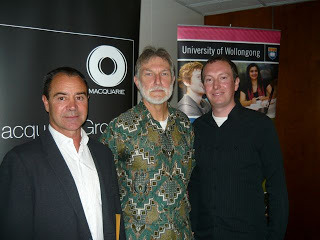 Kim Scott (That Deadman Dance), Dr Paul Sharrad (judge extraordinaire), Craig Cliff (A Man Melting)There's also proof I gave a speech, but this also proves I can look like a slender-spined porcupine fish, some I'm not sharing.
Kim Scott (That Deadman Dance), Dr Paul Sharrad (judge extraordinaire), Craig Cliff (A Man Melting)There's also proof I gave a speech, but this also proves I can look like a slender-spined porcupine fish, some I'm not sharing.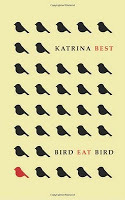
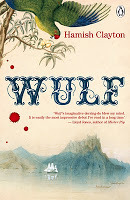 4. Today I
4. Today I 5. In non-CWP news (phew, they say), I bought a copy of Wulf by Hamish Clayton for Buy a NZ Book Day (Saturday). Looking forward to reading it, though my TBR pile is set to topple. I wonder if readers of e-books have that gut-punch of guilt when they think about all the books they want to / have to read without the actual physical peril of the books in their lives?
6. Answers to questions in 4 and 5: Probably weightlifting (you're not competing against anyone but yourself, etc; it's made for epic failures) and probably yes.
March 4, 2011
An embargo, a flying visit and a mystery barge: my Commonwealth Writers Prize experience
Actually, this isn't that much of a newsflash. It was announced in Sydney on Wednesday night (I was there, more on this later) and the results were published in Australian newspapers (like this from the Syndey Morning Herald) on Thursday morning. It took a bit longer to break the news here in NZ, but by Thursday afternoon it was doing the rounds on Twitter. I got a phone call from a Dom Post reporter yesterday (Friday) and today a tiny piece appeared in my local paper.
But the news is even older than that for me.
I found out (by reading Beatties Book Blog rather than any direct correspondence) that I was short-listed for best first book on Friday 11 February.
For the next few days I was over the moon with making that far. I circled March 3 in my moleskine as the day the regional winners would be announced and began tempering my expectations.
As I blogged here on 16 February, the press release from the Commonwealth Writers Prize on the short-list mentioned that the first book nominees included "a comic treatment of the Rapture in the US, a story of Aborigines, a detective thriller involving an historical right-wing militia culminating in the opening of Sydney Harbour Bridge, an obsessive cartographer and her twin sister living down trauma from the collapse of Yugoslavia, and the laconic lives of casual grape pickers in rural Australia."
No mention of anything from A Man Melting = no chance of winning. Or so I thought.
When I blogged on the 16th, I was actually being a bit disengenous. This was what I'd thought in those first few days of being short-listed, but by the time I posted it, I knew I'd won!
*
Musical interlude:
*
Don't feel bad, general public to whom I lied. I also lied to my mum, my brother (who lives in the same house as me), my in-laws-to-be, my boss and workmates, my friends, the Wellington Branch of the NZ Society of Authors, Creative New Zealand (I applied for a residency, but could only put that I'd been short-listed), the Auckland Writers Festival and probably a couple more trusting souls. It's called an embargo, and I certainly wasn't going to break the first one that applied to me! It was a test, and I passed.
I think.
When I was invited to the announcement of this region's winners on 3 March in Sydney, I asked the Sydney based administrator if I got any travel assistance, since, y'know, I'd won and all? It seems only the 3 SE Asia and Pacific judges and the UK based administrator who was organising the week of activities for all the regional winners in May knew the results... But if I hadn't have spilt the beans, I may not have made it to Sydney for 23 fun-filled hours to collect my prize and take a whole heap of selfies.
*
Example of a selfie from Sydney:
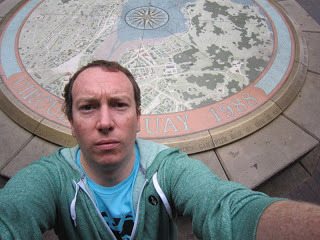
*
Sidenote: Not telling someone you've won something when the information is strictly embargoed probably isn't lie. Proper lies do damage to the receiver, whereas in this case, most of the time I was damaging my own chances of getting a residency or attracting people to my session at the Auckland Writers Festival or getting my friends to buy me beer.
*
Sydney
I caught the 6am flight from Wellington (which entailed getting up before 4am), arrived in Sydney around 9am, but couldn't check into my hotel room until later because there were no rooms ready yet.
I walked around town, basically doing a circuit down George Street (checking out camera shops: I plan to spend the prize money on a digital SLR camera) to Circular Quay and back up Pitt Street, then hanging out in Hyde Park.
It was 2pm when I finally got to check in and have a shower, shave, iron my shirt and compose myself for my first ever acceptance speech.
I didn't write anything beforehand and just winged it. People said it was good but afterwards I realised I totally missed a trick. If I had the chance again, I would begin thusly:
Thank you Elizabeth [the person who handed me the award]. I'm not used to giving acceptance speeches. The only other time I've won anything to do with writing was the novice award at the BNZ Katherine Mansfield short story competition in 2007, which just so happened to coincide with the time I was in Europe. So I sent my mum along to receive my award. Unfortunately my mum couldn't be here this evening, so I'll just muddle through...*
I actually have video of my mum's speech (I wrote the speech at a friend's place in Hamburg; she read it, with one small extemporaneous addition) on a DVD somewhere. I'm not sure where though.
*

 At the awards ceremony there were some of the other short-listed writers and their publishers, from both the first book and big boy categories – but not all of the short-listed writers. I was the only representative from New Zealand, so I guessed early on that Lloyd Jones and Patrick Evans hadn't won the non-first book prize. No one from Random House NZ came over to cheer me on, which some of the people there thought was a bit off – me: I understand money's tight at the mo with the whole RED Group thing, and I think they trusted me to equip myself well at such a shindig. I hope I don't become one of those authors who expects to be coddled... I'm not sure publishers will have the luxury of coddling authors in the brave new world of books anyway.
At the awards ceremony there were some of the other short-listed writers and their publishers, from both the first book and big boy categories – but not all of the short-listed writers. I was the only representative from New Zealand, so I guessed early on that Lloyd Jones and Patrick Evans hadn't won the non-first book prize. No one from Random House NZ came over to cheer me on, which some of the people there thought was a bit off – me: I understand money's tight at the mo with the whole RED Group thing, and I think they trusted me to equip myself well at such a shindig. I hope I don't become one of those authors who expects to be coddled... I'm not sure publishers will have the luxury of coddling authors in the brave new world of books anyway. Also in attendance were people involved with the Commonwealth Writers Prize, such as current and past judges (most of whom were Australian academics), sponsors (the event was at Macquarie's offices), publicists, literary agents, the odd reporter and other Aussie writers.
I had a surreal conversation with the two publicists who had worked on the regional prize. One clearly knew I'd won, and kind of asked if I knew I'd won, but I was still so used to demurring in such situations that I kind of shrugged and grabbed a mini Yorkshire pudding and beef canapé and shoved it in my mouth. I can;t remember the other publicist saying a single word.
The speeches started with the obligatory thanks to the backers, then Dr Paul Sharrad, the chair of the judging panel, said a bit about each of the six short-listed books in the two categories.
Speaking about A Man Melting, he mentioned three specific stories, though not by name: 'Unnatural Selection' ("the story of a woman returning home after living in the United States...") 'Manawatu' ("a story that tackles suicide..."), and "my favourite, the trials of a woman cooking for a tribe of London school kids on a barge in bad weather."
Thing is, that story is not in my book, nor is it one I've written. When he was giving his speech I thought maybe he'd mixed up the elements of 'Fat Camp' (a man moves to Scotland with his partner to run weight-loss camp for teens and ends up running the black market in chocolate bars), but it's also mentioned in a press release... he's clearly talking about another story.
 Perhaps it's a story in Amanda Lohrey's collection of short stories,
Reading Madame Bovary
, which was short-listed for the non-first book award. We were the only short fictioneers amongt the twelve short-listees, and I can see how books may blend into one another..
Perhaps it's a story in Amanda Lohrey's collection of short stories,
Reading Madame Bovary
, which was short-listed for the non-first book award. We were the only short fictioneers amongt the twelve short-listees, and I can see how books may blend into one another..So I'm just writing that down as weird, and will not freak out that the chair of the judging panel's favourite story in my book is not in my book.
*
Fact-checked excerpt from the press release post-announcement
"A Man Melting marks the appearance of a lively new voice in New Zealand writing, wry, punchy, filled with fresh images [this sounds like me], and providing an engaging mix of fantasy and gritty realism [uh-huh]. It handles both male and female characters convincingly [why thank you] and tackles serious social concerns such as suicide [tick] with a combination of delicacy and dramatic directness [if you say so]. The stories cover a range of situations [definitely] from the emotional process of returning home from overseas [see 'Unnatural Selection'], to cooking for a tribe of London school kids on a barge in bad weather [um...]. These are extraordinary stories [I couldn't possibly comment] about ordinary people [tick], and they are told with a great deal of affection [I am a big softy]. It is a consistently powerful and entertaining collection [*blushes*] and is awarded the prize accordingly."
*
After the prizes were announced and the acceptance speeches had been delivered (Kim Scott said: "I'd just like to echo everything that Craig said," which made me feel good, and means Kim Scott also thanked the New Zealand Ministry of Education for being a flexible and supportive employer), it was time for a few photos. They had a small number of all the short-listed books for sale and they all sold out. I signed about five. My Australian sales figures increased exponentially in one night. Then we finished the free booze and canapés and I went to dinner with some of the Commonwealth Writers Prize people, including Dr Paul Sharrad (I didn't mention the barge story), the administrator for whom I spoiled the surprise of my victory (we discussed this at length), and a bunch of other good people to know in Australian letters. Much wine was consumed.
*
I flew back to Wellington on the 8.45am flight the next day.
I know the burning question you all have: What movies did I watch on the plane?
Going there: The Social Network. Verdict: A very good movie, well put together.
Coming home: 127 Hours (aka the one where James Franco is trapped in a canyon and has to cut his hand off). I was interested in how the movie would handle a story which is ultimately like Titanic (we know it'll sink) but with less characters and less movement. I thought it did a good job. Only problem was I mistimed things and got served my breakfast right when he starts hacking off his arm. I can't watch surgery shows on TV, so this wasn't a good thing. Even averting my eyes from the screen, I still got the electric screech through my earphones every time he snipped a nerve or tendon. When I tried to open the little capsule of milk for my cup of tea, the ends of my fingers were all numb and the capsule when flying under the feet of the person seated next me.
 *
*So, that's my Sydney story.
Work on Friday was a real struggle. Back to earth with a thud – even though there was carrot cake for morning tea and people congratulated me throughout the day, it was still work.

Now that the other region's winners have been announced, I'm even more excited about the week of activities in Sydney in May. Amongst the winners are Emma Donaghue (Canada) whose novel Room was my favourite to winner the Booker Prize last year (I was wrong), and one of my favourite writers, David Mitchell (UK). Eep. I'll have to work on how not to sound like a fanboy now that I've got this whole embargo thing mastered.



